The liver is a large organ that accounts for about 2% of the average adult body weight. Your liver constantly works hard to keep you healthy by performing a series of important functions, such as filtering harmful substances from your blood, breaking down toxins, and supporting metabolism, immune function, digestion, and more.
Following a nutritious diet rich in foods known to support and protect the liver can help prevent common liver diseases, such as nonalcoholic fatty liver disease (NAFLD), and promote optimal liver function.
Here are the 10 best foods for liver health, as well as other suggestions for preventing liver disease.
1. Fruits and Vegetables
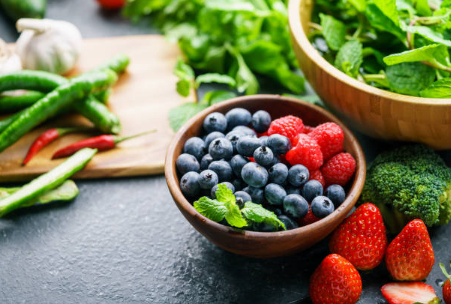
Following a diet rich in fruits and vegetables, including berries, leafy greens, and cruciferous vegetables, is one of the best ways to take care of your liver from the inside out.
Fruits and vegetables are rich in liver-protecting nutrients such as fiber, vitamins, minerals, and plant compounds. Fiber-rich foods, such as fruits and vegetables, can help prevent and reduce fat accumulation in the liver by increasing feelings of fullness, which can help promote fat loss. The anti-inflammatory and antioxidant substances contained in fruits and vegetables, such as carotenoids and polyphenols, can help prevent inflammation-related liver damage.
Diets rich in fruits and vegetables, such as the Mediterranean diet, have been shown to be effective in preventing and treating fatty NAFLD.
Additionally, a diet rich in vegetables may help reduce the risk of liver cancer. A 2019 review found that higher vegetable intake was associated with a 39% lower risk of liver cancer, with a 4% reduction in liver cancer risk for every 100 grams (g) increase in daily vegetable intake.
2. Ginger
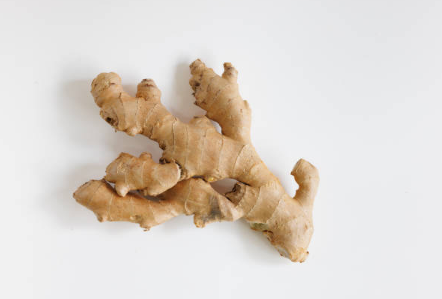
Ginger is derived from the root of ginger, a plant in the ginger family. Consuming it has a variety of benefits, including improved liver health. Ginger contains several anti-inflammatory and antioxidant compounds, such as gingerol and gingerol, which may be beneficial for people with certain liver diseases, such as NAFLD.
These compounds can help prevent and improve liver disease by reducing oxidative stress and the production of pro-inflammatory substances that may otherwise cause cell damage.
In a 2020 study of 46 patients with NAFLD, treatment with 1,500 milligrams (mg) of ginger powder daily for 12 weeks resulted in significant reductions in markers of inflammation and liver disease, including the liver enzymes alanine aminotransferase (ALT), fetuin-A, and C-reactive protein (CRP), compared to placebo treatment.
Ginger powder and fresh ginger can be added to many sweet and savory dishes, making it a smart kitchen ingredient for people with liver disease.
3. Garlic
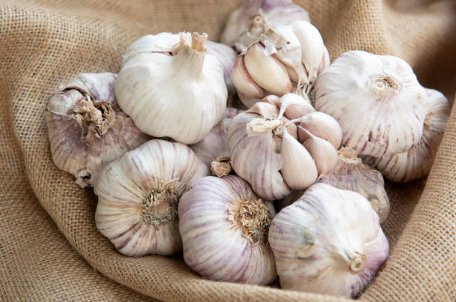
Like ginger, garlic is also rich in liver-supporting substances, including allicin, allicin, and ahorene, which have powerful antioxidant and anti-inflammatory effects in the body.
Regular consumption of garlic may help improve liver health in people with liver disease and even reduce the risk of liver cancer.
A 2020 study of 90 patients with NAFLD showed that the group supplemented with 1,600 mg of garlic powder daily for 12 weeks had lower levels of the liver enzymes ALT and aspartate aminotransferase (AST) and significantly reduced liver fat. Placebo group.
Additionally, studies have shown that eating raw garlic regularly may reduce the risk of liver disease, such as NAFLD and liver cancer, in certain populations.
For example, in a 2019 study of 9,944 Chinese adults, eating raw garlic two or more times per week was associated with a 23% lower risk of liver cancer, compared to no raw garlic or eating raw garlic less than twice a week.
4. Chia Seeds and Flax Seeds
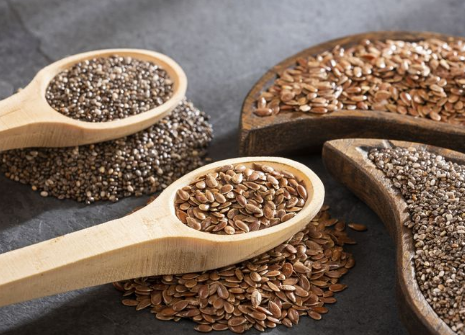
Chia seeds and flaxseeds are rich in fiber, which is important for people with liver disease. High-fiber foods can help prevent liver disease by reducing overall calorie expenditure and supporting a healthy weight, as well as stimulating the growth of beneficial bacteria in the gut, which can reduce inflammation and prevent liver damage.
A 2020 study of 25 patients with NAFLD found that taking 25 grams of ground chia seeds daily for 8 weeks of treatment resulted in NAFLD regression in 52% of participants.
Studies have also shown that flaxseed consumption can reduce liver disease markers and liver fat accumulation in patients with NAFLD and may help prevent liver cancer.
5. Olive Oil
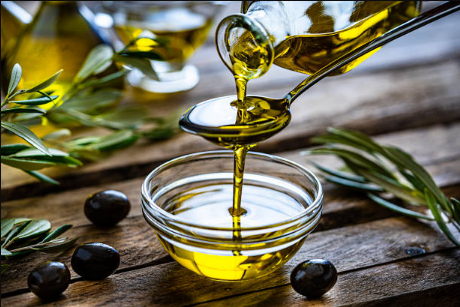
Olive oil is an important part of the Mediterranean diet, an anti-inflammatory dietary pattern that is associated with liver health benefits. Olive oil contains high levels of monounsaturated fats and antioxidants, which may help reduce fat accumulation in the liver, reduce the risk of heart disease in people with liver diseases such as NAFLD, and prevent liver disease.
A recent 2023 study of 2,436 adults found that those with the highest intake of extra virgin olive oil had a 26 percent lower risk of NAFLD compared to those with the lowest intake. Olive oil has the greatest NAFLD protection in obese people.
Additionally, the antioxidant compounds found in olive oil may help promote general liver health by protecting liver cells from oxidative damage and preventing inflammation.
6. Seafood
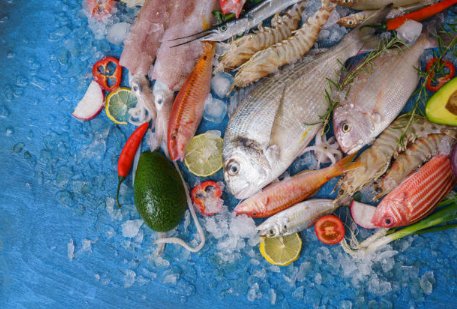
Seafood is rich in liver-protecting nutrients such as anti-inflammatory fats, as well as antioxidant nutrients such as selenium and vitamin E.
Studies have shown that a diet rich in seafood may help reduce liver fat and prevent liver diseases such as NAFLD and liver cancer.
A 2020 overall review of 34 meta-analyses found moderate-quality evidence that an increase in fish consumption of 100 grams per day was associated with a 35% lower risk of liver cancer. The researchers note that the high levels of anti-inflammatory omega-3 fatty acids in seafood may have a protective effect on cancer risk, especially inflammation-driven cancers, such as liver cancer.
7. Coffee and Tea
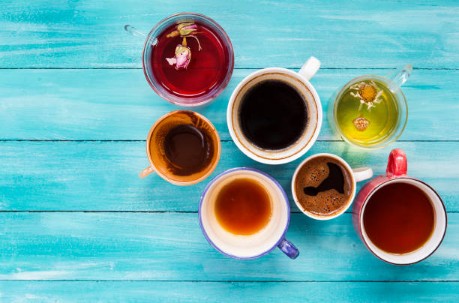
Coffee and some types of tea, such as green tea, are rich in antioxidants. Drinking coffee and certain types of tea has been shown to protect against liver diseases such as liver cancer. High consumption of coffee and green tea has been linked to a significant reduction in the risk of liver cancer and other liver diseases.
8. Cocoa Products

Eating more cocoa products, such as chocolate, may help protect liver health. Some studies have shown that chocolate consumption can help lower liver enzyme levels and improve other aspects of health in people with liver disease. However, it’s best to choose cocoa products with little or no added sugar, as added sugar is harmful to liver health.
9. Legumes
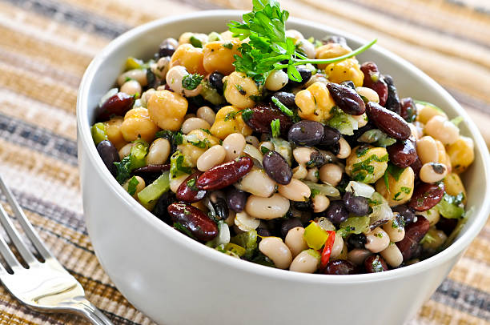
Legumes, such as lentils and legumes, are high in fiber, a nutrient that supports liver health. They are also a good source of antioxidants. Studies have shown that adding legumes to the diet can help protect liver health by reducing body weight, reducing liver enzymes, lowering blood pressure levels, and more.
10. Nuts and Seeds
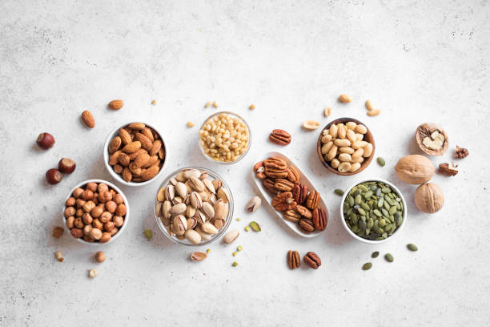
Nuts and seeds are highly nutritious, and regular consumption as part of a healthy diet may help reduce the risk of liver disease like NAFLD. However, certain nuts, such as imported peanuts, can be contaminated with aflatoxins, which can be dangerous for people with liver disease. To reduce the risk of exposure to aflatoxins, it is recommended to only buy nuts and nut butters from major commercial brands that adhere to strict safety guidelines, and to discard nuts that look moldy or discolored.
Foods to Avoid
While a diet rich in nutrient-dense foods can help protect liver health and support optimal liver function, consuming certain foods and beverages too frequently can trigger and worsen liver conditions.
For optimal liver health, the intake of the following foods and beverages should be minimized:
- Foods and drinks high in added sugar: Consuming too much sugar, especially fructose, can damage the liver and lead to liver fat accumulation. High fructose intake has been associated with an increased risk of fatty liver disease. Studies have shown that people who drink sugar-sweetened beverages, such as soda, every day are more than 50% more likely to develop fatty liver than those who don’t.
- Red and processed meats: Red and processed meats are rich in inflammatory fats and other compounds that cause inflammation and cell damage. High intake of red and processed meat increases the risk of NAFLD and liver cancer.
- Ultra-processed foods: Ultra-processed foods, such as packaged snacks and fast food, have been linked to many health conditions, including liver disease. Ultra-processed foods should be kept to a minimum to protect overall health, including liver health.
- Alcohol: Excessive alcohol consumption can damage the liver, significantly increasing the risk of liver diseases such as liver cancer and alcoholic cirrhosis. Studies have shown that women who drink 1 or more drinks per day and men who drink 2 or more drinks per day have a 42% increased risk of developing liver cancer and a 17% increased risk of liver cancer death compared to those who drink less.
While not all liver disease risk factors are within your control, cutting back on the foods and drinks listed above can help protect your liver.
How to Include Liver-Healthy Foods in Your Diet
In general, eating more nutritious whole foods such as fruits, vegetables, legumes, and seafood, and less ultra-processed foods, alcohol, and added sugars is best for liver health. Additionally, a well-rounded diet that prioritizes healthy foods can also help reduce the risk of other common health conditions such as heart disease and diabetes.
Here are a few ways to incorporate liver-healthy foods into your diet:
- Add a fresh vegetable salad to dinner, drizzled with olive oil and balsamic vinegar
- Eat fresh fruit or sliced vegetables and hummus
- Drink black coffee or green tea in the morning
- Incorporate seafood, such as fatty fish, into your weekly dinner menu
- Use cocoa powder, monk fruit, and milk of your choice to make a comfortable, liver-friendly cup of hot cocoa
- Use fresh or powdered ginger and garlic to add flavor to your recipes
Adding nutritious foods to your meals and snacks can help support your liver and reduce your risk of several health conditions.
Other Ways to Protect the Liver
In addition to following a healthy diet, other factors can also have a positive impact on liver health.
The following lifestyle changes can help prevent liver disease and promote overall liver health:
- Lose excess body fat: Excess body fat, especially belly fat, is a major risk factor for liver disease.
- Exercise regularly: Staying active can help you maintain a healthy weight and reduce your risk of liver disease.
- Quit smoking and avoid drugs: Smoking and illegal drug use can also damage the liver and lead to other health problems.
- Use medications and supplements responsibly: Overuse or inappropriate use of common medications, such as pain relievers and herbal supplements, can damage your liver and lead to serious liver-related complications. Never mix medications unless specifically advised to do so by your healthcare provider.
- Practice safe sex: Hepatitis is a liver disease that can be spread through sexual contact.
Following a healthy diet and lifestyle and protecting your liver by avoiding overuse of toxins such as medications and smoking can help keep your liver healthy and reduce your risk of liver disease.
Conclusion
Your liver has life-sustaining functions, including removing toxins and waste products from your blood, so it’s important to follow a healthy diet and lifestyle to take care of your liver.
Adding certain foods to your diet, such as fruits, vegetables, ginger, garlic, and seafood, can help promote liver health by reducing inflammation, preventing cell damage, and lowering markers of liver disease.
Following a nutritious, well-rounded diet and leading a healthy lifestyle by avoiding behaviors known to negatively affect the liver, such as excessive alcohol consumption, is an easy way to support and protect the liver and promote overall health.